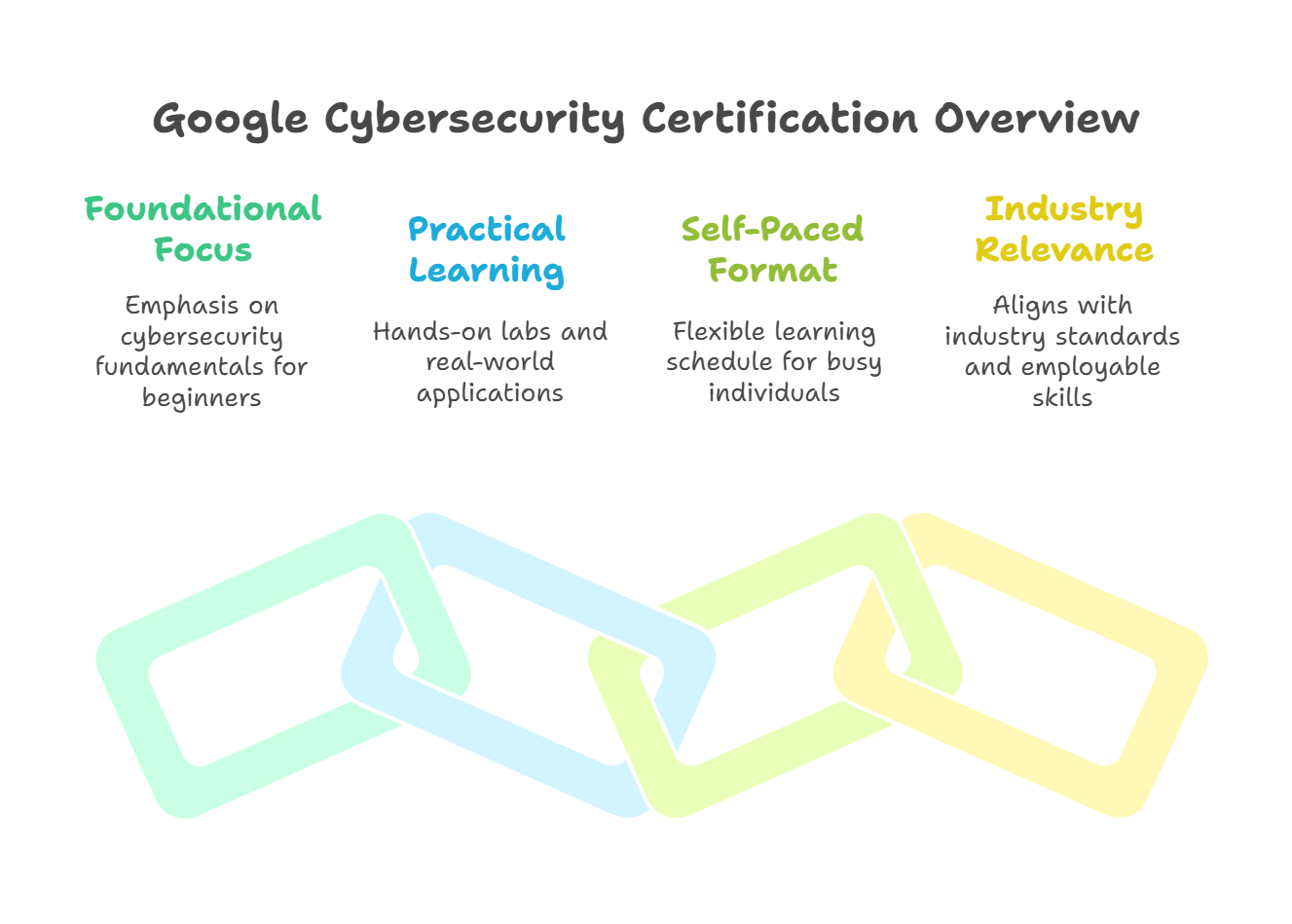Table of Contents
- What is the Google Cybersecurity Certification?
- Key Features of the Google Cybersecurity Certification
- Google Cybersecurity Certification Curriculum
- Pros and Cons of the Google Cybersecurity Certification
- Career Outcomes and Opportunities
- Comparing Google Cybersecurity Certification to ACSMI Certification
- Final Thoughts
- FAQs on Google Cybersecurity Certification
The world of cybersecurity is evolving rapidly. As organizations face increasingly sophisticated cyber threats, there’s an urgent need for skilled professionals to secure digital infrastructures. Whether you’re starting your career in cybersecurity or looking to enhance your skills, certifications are crucial for demonstrating expertise. The Google Cybersecurity Certification has emerged as a popular choice for many aspiring professionals, but does it meet the expectations of those looking to enter the field?
In this Google Cybersecurity Certification review, we’ll dive deep into the program’s structure, benefits, and career outcomes. Additionally, we’ll compare Google’s offering with other certifications, such as the ACSMI Certification, which features over 400 advanced modules. This comparison will help you determine whether the Google certification is right for your career goals.
What is the Google Cybersecurity Certification?
The Google Cybersecurity Certification is a beginner-friendly program designed to introduce learners to the basics of cybersecurity. Hosted on platforms like Coursera, it offers a flexible, self-paced learning experience. The certification covers a wide range of essential cybersecurity concepts such as network security, incident response, threat detection, and risk management.
The certification is perfect for individuals who are new to cybersecurity and want a comprehensive, practical introduction to the field. Throughout the program, learners engage in hands-on labs that simulate real-world cybersecurity challenges, offering an effective way to apply the knowledge they gain.
Key Features of the Google Cybersecurity Certification
Here’s a breakdown of what makes the Google Cybersecurity Certification stand out for beginners:

1. Foundational Focus
The program is designed for beginners, with a strong emphasis on fundamentals. Topics such as IT security, incident response, network security, and risk management are covered in detail, making it an excellent choice for individuals with little to no prior technical knowledge in cybersecurity.
2. Practical Learning
One of the main selling points of the Google Cybersecurity Certification is its focus on real-world applications. The certification includes hands-on labs and scenarios that mimic actual cybersecurity tasks, such as identifying threats, responding to incidents, and securing networks. This practical approach ensures that you can directly apply the skills you’ve learned to a professional setting.
3. Self-Paced Format
The certification is designed to be flexible. You can complete the coursework at your own pace, which is ideal for individuals balancing full-time jobs, family responsibilities, or other commitments. Most participants typically complete the program in 4 to 6 months, dedicating around 5-10 hours per week to study.
4. Industry Relevance
Google’s cybersecurity certification aligns with industry standards, which helps learners gain employable skills. How Much is Google Cybersecurity Certification? The program includes a range of tools and techniques used in the cybersecurity field, ensuring that the knowledge gained is directly applicable to the evolving job market.
Google Cybersecurity Certification Curriculum
The curriculum is designed to provide learners with the foundational skills needed to embark on a cybersecurity career. Here’s an overview of the key topics covered in the certification:
-
Network Security: Learn how to secure computer networks, protect against unauthorized access, and defend against common cyber threats.
-
Incident Response Planning: Understand how to respond to and recover from security incidents, including breaches and cyberattacks.
-
Threat Detection: Develop the skills necessary to identify vulnerabilities and security risks within a network.
-
Risk Management: Learn how to assess and manage cybersecurity risks in real-world environments.
-
Hands-On Labs: Apply your knowledge in simulated environments to solve real-world cybersecurity problems.
The certification offers a well-rounded education, which prepares you for entry-level roles in cybersecurity.
Pros and Cons of the Google Cybersecurity Certification
Why Choose the Google Cybersecurity Certification?
There are several reasons why the Google Cybersecurity Certification is a solid choice for individuals new to the field:
-
Beginner-Friendly Approach: It is specifically tailored for individuals without prior experience in IT or cybersecurity. This makes it an accessible entry point into the field.
-
Flexible Learning: The self-paced structure allows you to learn at your own pace, making it ideal for students and working professionals.
-
Google Branding: Google is a global tech giant with a strong reputation, and having their certification on your resume can help you stand out to employers.
-
Cost-Effective: The subscription-based pricing model makes it an affordable option for many learners, with the program costing around $39 per month.
Limitations of the Google Cybersecurity Certification
While the Google Cybersecurity Certification offers many benefits, there are some limitations to keep in mind:
-
Geared Toward Beginners: The certification is primarily aimed at individuals with little to no experience in cybersecurity. More advanced professionals might find it too basic.
-
Lack of Leadership Training: The focus of the program is on technical skills, with limited emphasis on management or leadership training. For those aiming for senior or strategic roles, additional certifications may be necessary.
-
Advanced Learning Required for Senior Roles: To progress to higher-level positions in cybersecurity, you may need to pursue more advanced certifications like ACSMI or CISSP.
Career Outcomes and Opportunities
The Google Cybersecurity Certification is an excellent starting point for individuals seeking entry-level roles in cybersecurity. Upon completion, you’ll be prepared for several in-demand positions, such as:
-
IT Support Specialist with a Security Focus: Help organizations secure their IT infrastructure while assisting with everyday IT support tasks.
-
Junior Cybersecurity Analyst: Monitor systems, identify vulnerabilities, and respond to potential threats.
-
Incident Response Specialist: Work on teams to handle real-time security incidents and mitigate any damages caused by breaches.
For those looking to pursue higher-level roles, completing the Google Cybersecurity Certification can serve as a stepping stone. Combining it with more advanced certifications, like the ACSMI Certification, will make you a more competitive candidate for leadership positions in cybersecurity, such as CISO or Security Operations Manager.
Comparing Google Cybersecurity Certification to ACSMI Certification
When comparing the Google Cybersecurity Certification to the ACSMI Certification, several key differences emerge based on the target audience and career goals:
-
Google Cybersecurity Certification:
-
Target Audience: Beginners and individuals transitioning into cybersecurity.
-
Focus: Foundational knowledge in areas such as network security, incident response, and threat detection.
-
Ideal For: Entry-level professionals or those seeking to break into cybersecurity.
-
Career Path: Helps launch careers in entry-level roles, such as Junior Cybersecurity Analyst or IT Support Specialist.
-
-
ACSMI Certification:
-
Target Audience: Mid-level to advanced professionals.
-
Focus: Advanced topics like quantum cryptography, multi-cloud security, and AI threat detection.
-
Ideal For: Professionals looking to specialize and move into leadership roles.
-
Career Path: Prepares professionals for roles such as Chief Information Security Officer (CISO) or Security Operations Manager.
-
Both certifications offer value and can complement each other. Starting with Google’s certification will give you the foundational skills needed for cybersecurity, and later progressing to the ACSMI Certification will help you specialize and climb the career ladder.
Final Thoughts
In conclusion, the Google Cybersecurity Certification is an excellent starting point for individuals looking to enter the cybersecurity field. It provides a solid foundation in key areas such as network security, incident response, and threat detection, while being affordable and flexible. For those starting their careers or transitioning into cybersecurity, this certification offers a practical approach that’s easy to follow and implement.
However, to move into higher-level roles or specialize in niche areas of cybersecurity, pursuing further education through more advanced certifications like ACSMI is essential. Combining these certifications will ensure you have both the foundational knowledge and the advanced skills needed to succeed in the ever-evolving cybersecurity landscape.
Now is the time to start investing in your cybersecurity career. Begin with Google Cybersecurity Certification for a strong foundation, and as you grow, consider exploring ACSMI or similar advanced programs to continue your professional development.
FAQs on Google Cybersecurity Certification
Q1. Who is the Google Cybersecurity Certification for?
It’s ideal for beginners, students, and professionals transitioning into the cybersecurity field.
Q2. How long does it take to complete?
The program typically takes 4–6 months, with about 5–10 hours of study per week.
Q3. How much does it cost?
The subscription fee is $39 per month, making it an affordable option for many learners.
Q4. Do employers value the Google Cybersecurity Certification?
Yes, Google’s reputation lends credibility to the certification, and employers recognize the value of the program’s practical focus and real-world application.
Q5. Can I progress to advanced certifications after this?
Absolutely! After completing Google’s certification, you can advance to more specialized certifications like ACSMI or CISSP to deepen your expertise.

Leave a Reply